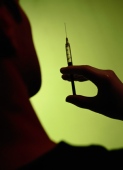- 8 Ways to Increase Dopamine Naturally
- 7 Best Breads for Maintaining Stable Blood Sugar
- Gelatin vs. Collagen: Which is Best for Skin, Nails, and Joints?
- The Long-Term Effects of Daily Turmeric Supplements on Liver Health
- Could Your Grocery Store Meat Be Causing Recurring UTIs?
- Are You Making This Expensive Thermostat Error This Winter?
- Recognizing the Signs of Hypothyroidism
- 10 Strategies to Overcome Insomnia
- Could Artificial Sweeteners Be Aging the Brain Faster?
- Techniques for Soothing Your Nervous System
‘Friends and Family’ OD-Reversal Kits Are Saving Addicts’ Lives


Friends and family members have saved the lives of tens of thousands of narcotic drug users from overdoses by using emergency injection kits containing naloxone (Narcan) — a medication that can potentially reverse the effects of some narcotic drugs, a new federal report says.
Almost 27,000 drug-overdose reversals using Narcan kits were reported to U.S. health officials between 1996 and 2014, according to the report.
“Overdoses are often witnessed by other drug users and family members of drug users,” said lead researcher Eliza Wheeler, DOPE Project Manager at the Harm Reduction Coalition in Oakland, Calif.
That’s why more than 600 organizations have programs in place to provide Narcan kits to friends and family of narcotic drug users. From 1996 through June 2014, these groups have provided Narcan kits to more than 150,000 people, according to the researchers.
The goal of these programs is to put the tools to reverse overdoses in the hands of people most likely to witness an overdose, Wheeler said.
These programs started because drug users were dying before help could arrive or before they could get to a hospital, she said.
In 2013 alone, almost 44,000 people died from drug overdoses, including more than 16,000 deaths from prescription painkillers, such as oxycodone (Oxycontin), and more than 8,200 deaths from heroin, the researchers reported.
The findings were published in the June 19 issue of the U.S. Centers for Disease Control and Prevention’s Morbidity and Mortality Weekly Report.
“There is a reluctance to call 911 among people who use drugs, so people were managing overdoses on their own — unsuccessfully in many ways. So programs started educating people who are likely to witness overdoses in how to deal with them,” Wheeler said.
These programs have taken off in the last few years as the fear of putting the drug into the hands of laypeople has subsided, Wheeler explained. “The number of organizations doing this has increased rapidly since 2013,” she said.
Since 1996, growing numbers of organizations have been supplying training kits containing Narcan to drug users and their families and friends, Wheeler said. Currently, 30 states and the District of Columbia have at least one organization that provides kits, she said.
Narcan acts against narcotics and quickly reverses their effects and restores breathing after an overdose, Wheeler said. The drug is commonly used in emergency rooms to treat overdoses and is often carried by police, fire and emergency medical services.
People can search the Internet for the closest program, Wheeler said. People can also get prescriptions from their doctor or, in some areas, from clinics or pharmacists who supply kits and training, she said.
Daniel Wolfe is director of the New York City-based Open Society International Harm Reduction Development Program. He said the new report is “confirmation of what many community groups in the U.S. and across the world have long known — that use of naloxone by people who use drugs is possible, practical, and lifesaving.”
Expanding availability of this safe, easy-to-use antidote is common sense, and should be a policy priority across the country, he said.
“Unfortunately, access is becoming more difficult as pharmaceutical companies raise the price of this essential medication,” Wolfe said. “Naloxone is less than a dollar a dose in many countries, but is $25 a dose or more in the U.S.,” he said.
More information
For more about naloxone, visit Stop Overdose.
Source: HealthDay
Copyright © 2026 HealthDay. All rights reserved.










